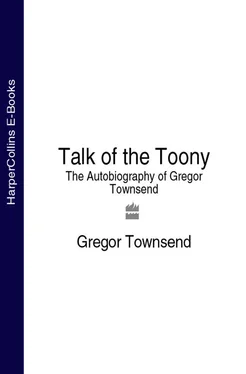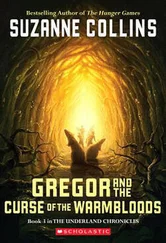I played sufficiently well to be selected for Scotland Under-15 against Wales Under-15 in 1988. I know it might sound clichéd, but the first time I wore the Scottish jersey was a hugely uplifting experience: something about the blue jersey made me swell up with pride. My performance in the game itself wasn’t anything special, and we lost 23–6 in front of a large Borders crowd. I hadn’t exactly frozen on this elevated stage, but I hadn’t done anything that suggested I’d attain any higher honours in the game.
It wasn’t until a year later that I convinced myself I could make it to the highest level. And on top of that, this epiphany came during a match in which I was on the wrong end of a fifty-point hammering. I managed to get picked for the South Schools team at the end of that season and even though Midlands Schools beat us heavily, I knew then that playing against better players only improved my own game. My build may have been more akin to the gable end of a crisp, but I played really well and scored two tries, one of them a longrange effort.
That season had seen a major improvement to my game, mainly because I was playing two, sometimes three, matches every weekend. Most people will probably agree with the maxim that being grown up isn’t half as much fun as growing up. This is certainly true in terms of my rugby career. The pressures, frustrations and emotional swings involved in professional rugby were not evident back when I was fifteen years old. Although my limbs were usually aching by the time I clambered into a bath on a Sunday night, I couldn’t wait to play the following weekend. On a Saturday morning I was now turning out for the senior side at the Academy and the following day I played for the Gala Red Triangle, which ran an Under-16 team. After a couple of months of the season, Craig asked me if I would be interested in also playing for the Under-18 side, the Gala Wanderers, who played on Saturday afternoons. The last time I had played with my brother was eight years previously and my parents had feared for my well-being. This time around they let me decide if I was ready. I soon became a regular and playing alongside my brother was a thrill, especially when we won most of the sevens tournaments at the end of the season.
These early games for Gala Wanderers were an essential part of my rugby education. Physically inferior to the other players, I had to use pace and evasion to get past opponents. There was also a much rougher edge to youth rugby than I’d been experiencing at school – my first game against Selkirk Youth Club ended up in a mass brawl that even involved some of our replacements on the touchline. It showed me that you could never afford to take a backward step in rugby. I also received some excellent guidance from our coaches, Johnny Gray and Arthur ‘Hovis’ Brown.
Enthusiasm is a crucial characteristic for any successful coach. This is even more the case when coaching youngsters. Johnny and Hovis had this in spades, and it was such a joy to train and play for them. They are real characters, full of banter and proud Gala men. Being coached by them made you feel you were part of something much bigger. I used to love hearing their stories. They also knew the game inside out – Johnny having coached the South to victory over Australia in 1984, and Hovis being full-back for Scotland in the Seventies before Andy Irvine came on the scene.
We were never dictated to or told to play in a certain way and I’m sure this freedom was a major help in enabling us to win the Scottish youth title at Murrayfield the following season. We had some really promising players like Mark Ballantyne, Greig Crosbie, Alan Bell and Alan Johnstone, but our antics must have driven the coaches mad at times. One night after a heavy snowfall they still wanted us to train – instead we went outside and built a snowman and then pelted them with snowballs. I’m sure Johnny was wishing he was still preparing to play the likes of Mark Ella and David Campese.
Like anyone else in Scotland, on 17 March 1990 I was celebrating the fact that we had beaten England to win the Grand Slam. Everything about that day at Murrayfield was a credit to the values of Scottish rugby at the time: humility, passion, graft and togetherness. Four days later I felt very privileged to run out on the same ground to play in the Schools Cup Final against St Aloysius. In fact during the next month I played on five occasions at Murrayfield. I had made it into the Scotland Schools side and we played three matches at the ground, together with a match against Ireland at Lansdowne Road. Unfortunately, all four games were lost.
The Schools Cup Final had also ended up in a defeat and left me with an embarrassing reminder each time I returned to the home of Scottish rugby. Before the match we were in the home dressing room, a vast area underneath the old West Stand. As was the tradition at the time, we had a pre-match ‘psych up’, which involved slapping our legs and faces then grabbing someone and wrestling with them. With memories of David Sole leading out his troops the previous Saturday, we were all pumped up. On the way out, in a rush of adrenalin, I kicked the door to the changing room. Unfortunately, my boot went right through the plywood, leaving a sizable hole. Each time I returned over the next few weeks, I was racked with guilt. Just as well the West Stand has now been replaced or I think the SRU would probably come looking for some compensation!
Following the success of Gala Wanderers in winning the national title at Murrayfield, I came under the radar of the Gala selectors. This I know, because my dad was still one of the selectors at the time. He had told me they wanted to give me a run at the end of that season, when I was still sixteen years old, but both he and my school coach, Rob Moffat, were not keen on the idea so it never happened. I had enjoyed an outing for Gala in the Kelso Sevens a few months later, but I presumed my final year at the Academy would be spent once again playing for the school in the morning and the Wanderers in the afternoon. That was how things were panning out until we broke up for the October holidays.
For a Borders youngster with a talent for sport, rugby was seen as the only true way to express your natural abilities. I grew up in the golden age of Borders rugby. We had some great ambassadors for the area – people like Gary Armstrong, Roy Laidlaw, John Jeffrey and John Rutherford – all of whom successfully blended courage, modesty and skill. The Scottish League officially started in 1973, the year I was born. Between then and 1990, the year I made my debut for Gala, there was only one occasion when a non-Borders team won the championship. So, when I was asked if I would be available to play for Gala in their league match away to Stirling County, I jumped at the chance.
A club’s tradition and history are what make it special. If the club is also your home town, it makes it something to aspire to be a part of. Even though it had been a few years since Gala’s run of three championship titles in the early Eighties, at the start of the Nineties the side still had a reputation of being a tough team to play against. They invariably finished in the top half of the table. One key difference that separated Gala from the likes of Hawick or Melrose was that they lacked a ruthless streak and a sizeable forward pack. However, Gala possessed many talented individuals. Players like Ian Corcoran, John Amos, Mark Moncrieff and Mike Dods were some of the most skilful in the country and were on the fringes of the Scottish squad. However, it was the more experienced players like Hamish Hunter, Peter Dods and Dave Bryson that I turned to as I prepared for my first match at that level.
Brideghaugh, Stirling’s home ground, was almost completely waterlogged after some torrential rain, but the game went ahead. We went on to lose 12–10, but I’d put in a decent enough performance. I relished the step up in intensity and the fact that everyone was taking things seriously. There had been times when I felt that there weren’t many of my teammates at school or youth level who cared that much about rugby. This time, however, I could see the guys were visibly upset at not coming away with a win. The Gala players had been great with me and were already talking about next week’s fixture as if I’d be playing.
Читать дальше












